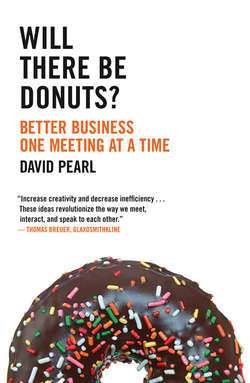Читать книгу Will there be Donuts?: Start a business revolution one meeting at a time - David Pearl - Страница 41
Really Meeting makes us Smarter
ОглавлениеOnce a month I walk out onto a theater stage in London’s West End to sing an opera I have never learned, with music I have never heard, characters that are completely new and no idea of where the story starts or ends. It’s like that recurrent nightmare people have about appearing naked in public with no script, combined with the pathological fear others have about having to sing in front of an audience.
I should say I am not alone, but part of a group of fellow thrill-seekers who make up the world’s only improvising opera company, Impropera (www.impropera.co.uk).
It’s never comfortable, but what makes it hugely valuable every time is to experience what a group of people can collectively invent when they are put under real pressure.
In the improv world it is called “Group Mind,” the capacity of several minds to think “as one.” When the show is good we each have a feeling that someone else came up with the good ideas. It’s the glue that holds together TV improv shows like Whose Line Is It Anyway? And I suggest it’s one of the key components of real meetings.
When you are really meeting, people don’t hang on to their own ideas but build on each others’. Instead of the plague of “buts” that stifle nearly meetings and stop the creative process flowing, a real meeting is full of “yesses” as the participants accept what is emerging and build on it. It’s business jazz.
Ron the Consultant sounds more like a jazz improviser than a business professional when he says, “A great meeting is where you turn up with 20 pages but use none of them. Instead you get up, gather round the flipchart and together you deal with what needs to be done.”
There’s a stark contrast with the “every person for themselves” character of the nearly meeting, as Pharma senior executive Thomas Breuer explains:
It’s a fundamental problem when you have a series of monologues happening. It’s so tempting just to leap in with your own idea. My colleagues and I have now trained ourselves to say “I paid a lot of attention to what you said—now let me build on this and give my view.” You create much higher value when you really concentrate on what the previous person said, rather than go 180 degrees with a completely disconnected idea. We now make a conscious effort to create something of higher value by joining the dots. When we do this the output of the meeting multiplies.
When you are in flow like this, your individuality seems to be replaced by a group identity. The ideas don’t originate from the individuals but emerge in the space between them.
It’s as if you are individual fingers but on the same hand. You hear sportspeople talk about this heightened team feeling. Likewise, soldiers working with comrades under testing conditions. While it’s crazy to think of the thumb and finger competing with each other, that is effectively what is happening when we nearly meet.
If you look down on meetings from an imaginary bird’s-eye viewpoint—and I recommend this perspective whenever you get stuck—participants look less like human beings and more like components of a larger network. I think of many radio telescopes combining to create an array of receivers that’s far more sensitive than a single unit. Seen from this eye-in-the-sky angle, a meeting isn’t really generating ideas, it’s amplifying the ones it picks up from “out there.”
“Out there” is where the customer is, where the business is really taking place, where the future is forming and true innovation lurks. Addicts of the inward-looking process meeting would do well to “turn the dish” outwards, because that is where the value is usually to be found.
Another word for this experience of flow is “ensemble,” a performing arts term—from the French word meaning “together”—for a group of virtuosos who agree to play, write and perform together. Though the myth of the lone genius is widely promoted in the arts world, the majority of great work is done by ensembles really meeting and creating together.
